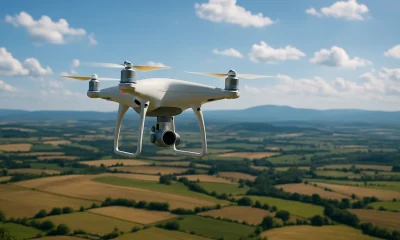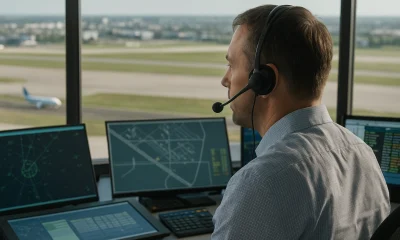- Acronym Guide
- AAM
- ABS
- AC
- ACAS
- ADS-B
- AEHF
- AFAC
- AGL
- AI
- AIM
- ALPA
- ALS
- AM
- AMA
- ANSP
- AOI
- APPI
- AUV
- AUVSI
- ARPAS-UK
- ASTM
- ATC
- ATO
- BLOS
- BVLOS
- CAA
- CAAC
- CAB
- CAP
- CASA
- CATT
- CBO
- CBR
- CBRN
- CDMA
- CDR
- CFI
- CFR
- CIR
- COA
- COMINT
- CORS
- COTP
- COTR
- CPTED
- CV
- C2
- DAA
- DAS
- DEM
- DFI
- DFS
- DGCA
- DHS
- DOD
- DPA
- DPEs
- DRG
- DRO
- DSM
- DSMX
- DSP
- DSSS
- DTM
- EASA
- EFT
- EO
- EOD
- EO/IR
- ELINT
- EMI
- ESC
- EVLOS
- eVTOLs
- FAA
- FCC
- FCS
- FHSS
- FICCI
- FLIR
- FOB
- FOV
- FPS
- FPV
- GBDAA
- GCP
- GCS
- GDPR
- GML
- GNSS
- GPS
- GSD
- GVC
- HDR
- HOGE
- IACRA
- ICAO
- ICS
- IED
- IMU
- INS
- IR
- ISA
- ISR
- ITU
- JARUS
- LAAMS
- LAANC
- LAATM
- LAI
- LAS
- LBA
- LIDAR
- LOS
- LSALT
- MAC
- MAVLink
- MLIT
- MMS
- MSL
- MTOM
- NDAA
- NCSL
- NFZ
- NIST
- NMEA
- NOTAM
- NPA
- NPRM
- NTIA
- OBIA
- OEM
- OFDM
- OGI
- OOP
- PAS
- PASM
- PAV
- PCV
- PdM
- PEC
- PIC
- PID
- PIPL
- PLD
- PM
- PN
- PPK
- PPS
- PSM
- PTZ
- PWM
- UAM
- UAOP
- UAS
- UASTM
- UAV
- UCAVs
- UHD
- UHF
- USV
- UTM
- RAIM
- RCC
- RCS
- RED
- ReOC
- RePL
- RFI
- RMS
- ROI
- RPAS
- RPC
- RTH
- RTN
- RTK
- SaR
- SAR
- SARP
- SBAS
- S.Bus
- SBIR
- SEDENA
- SfM
- SFOC
- SIGINT
- SLAM
- SMS
- SOP
- SORA
- STANAG
- STTR
- STK
- sUAS
- TCAS
- TCCA
- TFR
- TIN
- TLM
- TOF
- TP
- TPS
- TSA
- VHF
- VLOS
- VTOL
Drone Acronyms
What is DPEs (Designated Pilot Examiners)?
By
Jacob StonerTable Of Contents

Definition
DPEs stands for Designated Pilot Examiners. They are experienced pilots authorized by the Federal Aviation Administration (FAA) to conduct practical tests and issue airman certificates and ratings. DPEs play a critical role in evaluating the skills and knowledge of aspiring pilots and drone operators.
Relevance to the Industry
DPEs are essential for maintaining high standards in aviation by ensuring that only qualified individuals receive certifications. For drone operators, DPEs provide the necessary evaluations to obtain a Remote Pilot Certificate under Part 107, validating their competency in operating drones safely and effectively.
How Do Designated Pilot Examiners (DPEs) Work?
Designated Pilot Examiners (DPEs) play a critical role in the Federal Aviation Administration (FAA) certification process by conducting practical tests and checkrides for pilot certificates and ratings. DPEs are experienced pilots authorized by the FAA to evaluate the competency of pilot applicants. Here’s a detailed explanation of how DPEs work:
1. Purpose and Importance
- Certification: DPEs assess and certify the skills and knowledge of pilot applicants, ensuring they meet FAA standards.
- Standardization: Maintain consistent testing standards across the aviation industry, ensuring all pilots are evaluated fairly and rigorously.
- Safety: Contribute to aviation safety by certifying only those applicants who demonstrate the necessary competencies.
2. Qualifications and Selection
- Experience Requirements: DPE candidates must have significant aviation experience, including a high level of flight hours, various pilot certificates, and instructional experience.
- FAA Selection: Candidates undergo a rigorous selection process, including an evaluation of their qualifications, experience, and professional conduct. They must also pass an FAA initial standardization seminar and recurrent training.
- Authorization: Upon selection, candidates are designated as DPEs and authorized to conduct practical tests and checkrides within specific geographic areas and for certain types of certificates and ratings.
3. Key Responsibilities
- Conducting Practical Tests: DPEs conduct practical tests (checkrides) for pilot applicants, which include both oral exams and flight tests.
- Evaluating Competence: Assess the applicant’s knowledge, skills, and proficiency based on the FAA’s Practical Test Standards (PTS) or Airman Certification Standards (ACS).
- Issuing Certificates: If the applicant passes the practical test, the DPE issues a temporary pilot certificate. The FAA later mails the permanent certificate.
- Maintaining Standards: Ensure that all practical tests are conducted in accordance with FAA regulations and standards.
- Continuing Education: Attend FAA standardization seminars and recurrent training to stay current with regulations and maintain their designation.
4. How DPEs Work
- Pre-Test Procedures:
- Application Review: Review the applicant’s certification application through the Integrated Airman Certification and Rating Application (IACRA) system to ensure completeness and eligibility.
- Document Verification: Verify the applicant’s identity, logbook entries, medical certificate, and other required documentation.
- Oral Exam: Conduct an oral examination to assess the applicant’s knowledge of regulations, procedures, aircraft systems, weather, and other relevant topics.
- Flight Test Procedures:
- Pre-Flight Briefing: Provide a briefing to explain the test’s format, expectations, and safety considerations.
- Flight Test: Evaluate the applicant’s ability to perform various maneuvers and procedures as outlined in the PTS or ACS. This includes normal and emergency operations, navigation, and communication.
- Post-Flight Debriefing: Conduct a debriefing to provide feedback on the applicant’s performance, highlighting strengths and areas for improvement.
- Certification:
- Passing Applicants: If the applicant meets the required standards, the DPE issues a temporary pilot certificate, valid for 120 days until the permanent certificate arrives.
- Failing Applicants: If the applicant does not meet the standards, the DPE provides a detailed explanation of the deficiencies and outlines the steps for retesting.
- Record Keeping:
- Documentation: Maintain detailed records of each practical test, including the results, applicant’s performance, and any issues encountered.
- Reporting: Submit test results and necessary documentation to the FAA through IACRA or other specified means.
5. Applications and Use Cases
- Private Pilot Certification: Conducting practical tests for private pilot applicants, ensuring they have the necessary skills and knowledge to operate safely.
- Commercial Pilot Certification: Evaluating commercial pilot applicants to ensure they meet higher standards of proficiency and professionalism.
- Flight Instructor Certification: Assessing flight instructor applicants to certify their ability to teach and evaluate student pilots.
- Additional Ratings: Conducting tests for additional ratings, such as instrument, multi-engine, or type ratings, to expand pilots’ capabilities and certifications.
- Recurrent Testing: Performing recurrent tests for pilots needing to renew or maintain their certifications, particularly for airline transport pilots and flight instructors.
6. Advantages and Challenges
- Advantages:
- Expert Evaluation: DPEs bring extensive experience and expertise to the certification process, ensuring high standards of pilot competence.
- Convenience: DPEs provide localized testing services, making it easier for applicants to schedule and complete their practical tests.
- Standardization: Maintain consistency and standardization in pilot testing, contributing to overall aviation safety.
- Challenges:
- Consistency in Evaluation: Ensuring that all DPEs apply testing standards uniformly can be challenging, requiring regular training and oversight.
- Maintaining Currency: DPEs must stay current with changing regulations, procedures, and testing standards, requiring ongoing education and training.
- Demand and Availability: Balancing the demand for testing services with the availability of DPEs, particularly in regions with high pilot training activity.
7. Technological Advances
- Digital Record-Keeping: Use of the IACRA system for digital application processing and record-keeping, improving efficiency and accuracy.
- Advanced Simulation: Incorporating advanced flight simulators in the testing process to evaluate pilot skills in a controlled environment, especially for complex scenarios.
- Online Scheduling: Implementing online scheduling systems to streamline the process of booking practical tests and coordinating with applicants.
- Mobile Applications: Development of mobile applications to assist DPEs in managing schedules, accessing testing standards, and submitting results on the go.
Understanding how Designated Pilot Examiners (DPEs) work highlights their critical role in the pilot certification process. By conducting thorough and standardized evaluations, DPEs ensure that only qualified and competent individuals are granted pilot certificates, contributing to the overall safety and professionalism of the aviation industry.
Example in Use
“The drone operator scheduled a practical test with a DPE to complete the requirements for obtaining a Remote Pilot Certificate.”
Frequently Asked Questions about DPEs (Designated Pilot Examiners)
1. What is the role of a DPE in the certification process?
Answer: The role of a DPE in the certification process is to conduct practical examinations for aspiring pilots and drone operators. They evaluate the applicant’s proficiency in performing flight maneuvers, adherence to safety regulations, and overall operational knowledge. DPEs ensure that applicants meet the FAA’s standards for certification and issue airman certificates to those who pass the examination.
2. How do drone operators interact with DPEs?
Answer: Drone operators interact with DPEs by:
- Scheduling Practical Tests: Arranging appointments with DPEs to take the practical exam required for the Remote Pilot Certificate.
- Preparing for Evaluation: Demonstrating their ability to safely operate drones, adhere to regulations, and perform required maneuvers during the test.
- Receiving Feedback: Obtaining feedback and, if successful, receiving certification from the DPE upon passing the practical examination.
3. What are the qualifications to become a DPE?
Answer: Qualifications to become a DPE include:
- Experience: Extensive flight experience and a strong background in aviation, typically with a high level of certification and instructional experience.
- Training: Completion of specific FAA training programs designed for DPEs.
- Authorization: Approval and designation by the FAA to conduct practical tests and issue airman certificates.
- Professionalism: Demonstrating a high standard of professionalism, integrity, and adherence to FAA regulations and guidelines.
For examples of these acronyms visit our Industries page.
As the CEO of Flyeye.io, Jacob Stoner spearheads the company's operations with his extensive expertise in the drone industry. He is a licensed commercial drone operator in Canada, where he frequently conducts drone inspections. Jacob is a highly respected figure within his local drone community, where he indulges his passion for videography during his leisure time. Above all, Jacob's keen interest lies in the potential societal impact of drone technology advancements.
Pros
Cons
You may like


What is RED (Rapid Extraction Device) & How Does it Work?


What is IED (Improvised Explosive Device) & How Does it Work?


What is BLOS (Beyond Line of Sight) & How Does it Work?


What is ATO (Authority to Operate) & How Does it Work?


What is ALPA (Air Line Pilots Association) & How Does it Work?


What is AEHF (Advanced Extremely High Frequency)?